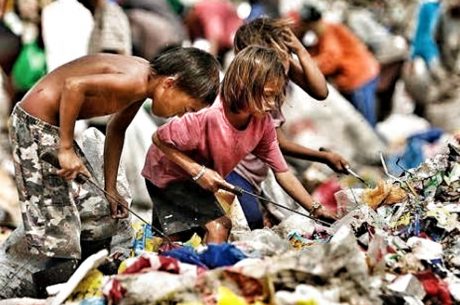
Why are Filipinos poor? Simple. Because they entered into too many commitments they, as a people, are inherently incapable of honouring. That’s essentially the definition of poverty in my book. As such, poverty in the Philippines is not the enormous problem it is made out to be. At its core, it is a simple problem that was created by a nation of simple people who lacked foresight.
To understand the simple reason why Filipinos are poor and understand the simple and obvious solution this reason begs, we first need to see clearly what creates wealth which is the opposite of poverty. History will show that much of what accounts for the unprecedented economic growth in societies over the last 500 years is technological development that resulted in increases in productivity (i.e. being able to generate more output per unit input).
Technology enabled productivity gain through:
(1) Increasing humanity’s ability to capture, store, and transmit larger and larger amounts of energy per capita.
Most animals can only rely on food to fuel themselves and their community. Some animals such as ants, squirrels, and some birds evolved capability to store food for future consumption. But it is only humans who harness and store other forms of fuel as input into conversion processes (fire, for example) that are external to their bodies to do work.
(2) Increasing the efficiency and variety of work that could be performed through this energy conversion.
Machines that could turn energy into mechanical and computational work are behind the huge improvements in the ability of human communities to control their environment, collaborate on complex endeavours, and organise in vast scales.
Societies that have demonstrated a consistent and sustained collective ability to advance technologically are those that have also delivered the biggest gains in personal wealth to its people.
In that respect, chronic poverty at national levels is consistently observed in societies that lack a tradition of scientific achievement and, as a consequence, technological advancement. Unfortunately, the Philippines is one such society. This is evident in the Philippines’ continued reliance on foreign technologies, processes, and expertise to develop its infrastructure, run its modern industries, and support much of its social and organisational capital. The Philippines may look like a modern society at the surface with its superficial veneer of democratic governance, liberal outlook, and urbane elite classes but underneath that is a core that subsists on foreign input.
In short, Philippine society’s indigenous technological capability cannot, by itself, sustain its people’s aspirational standard of living. Something as basic as committing to sustaining the enormous population Filipinos find themselves stuck with cannot be honoured to the standard most Westerners and northeast Asians enjoy. This leads one to the question of why Filipinos committed to such an enormous population to begin with. Said population had become a liability rather than an asset in this regard if seen from the context of Western standards of living.
As technologically-advanced societies grow economically, so too does the cost of the technology they export increase relative to the purchasing power of Third World countries that are dependent on it for their aspirational goals. As the income disparity between the First and Third World widens, so too does access to this technology. This is very different from the way the First World developed back in the olden days. Whereas societies that, for example, built their own rail infrastructure using indigenous technology when these were, themselves, developing economies, today’s developing societies merely buy the expertise and technology to build this infrastructure from the First World. Worse, even as this technology gets transferred from First World to Third, certain societies, such as that of the Philippines’, have exhibited a limited ability to absorb these technologies, sustain their advancement, and embed them deeply into domestic capability.
This weak absorption ability can be seen in, for example among many other examples, the Philippines’ spotty record (at best) of building and running public rail networks. Indeed, much of the public infrastructure that exists in the Philippines still remain largely accounted for by infrastructure that had been put in place by former colonial powers as Filipinos had, for the last several decades since being granted independence in 1946, exhibited very weak wherewithal to build upon these.
Yet Filipinos collectively continue to make commitments to supporting what eventually turn out to be liabilities. On average, every new Filipino that joins the workforce has a high probability of becoming an overseas foreign worker (OFW). Every new Filipino baby born has a high probability of becoming a street urchin. Every new voter, a potential non-thinking contributor to her country’s dysfunctional politics.
Most important of all, Filipinos have committed to that big piece of foreign governance technology —democracy. As is evident in the din of shrill “activism” we are subject to everyday, Filipinos are “committed” to “democracy”. But that commitment does not extend to honouring the responsibility that comes with being a “democratic” people which is apply modern thinking to the participation in said democracy. Filipinos seem to inherently lack that capability as well. As such, Filinos’ democracy too suffers from abject intellectual impoverishment.
So, indeed, the solutions to Philippine poverty are simple and, frankly, quite obvious. Filipinos should stop listening to “activists” who pander to their victim mentality and tell them their poverty is somebody else’s fault. They merely contribute to the impoverished thinking that keeps Filipinos poor and comfy with their poverty.
No comments:
Post a Comment